
11 minute read
SECTION D: Supporting Research Across the Spectrum (UCDG
SECTION D:
SUPPORTING RESEARCH ACROSS THE SPECTRUM (UCDG)

EMERGING RESEARCHERS
The aim of supporting emerging researchers was to develop the next generation of T-shaped research scholars based on Boyers model through supportive approaches to postgraduate training and early career staff development. These stories range from staff members who aim to complete their PhD to academics who were supported and could develop themselves as an academic.
Makhaya Malema is an emerging researcher in the field of Leisure, Recreation and Sports Management in the Department of Sports, Recreation & Exercise Sciences, Faculty of Community and Health Sciences. Makhaya Malema is currently a PhD candidate, with a focus on leisure education and leadership development amongst youth with physical disabilities in South Africa. Makhaya’s research is focused on community recreation, and sports programmes with non-governmental organisations from disadvantaged backgrounds. Mr Malema joined the developing the research scholar (DTS) program me in 2019. The aim of the DTS programme is to support the development of emerging academics and researchers as all round scholars.
He reported: “I found the programme very helpful and fundamental in developing my capacity as an emerging academic and contributed significantly in my approach towards my career plans. The programme contributed to my holistic development, and facilitated my growth as a new academic and researcher”.
EMERGING RESEARCHERS (contd.)
Dr Brighton M Mupangavanhu is a member
of the Mercantile & Labour Law Department in the Faculty of Law at the University of the Western Cape (UWC). Dr Mupangavanhu completed his PhD degree in Commercial Law at the University of Cape Town in July 2017. Dr Mupangavanhu teaches and researches primarily in Corporate Law and also in Commercial Transactions Law relating to financial services and law of payments.
In 2020, he was a recipient of the UCDG Fund which supported emerging researchers post PhD and which allows emerging researchers to create a research network post PhD or attend an international conference and present their PhD work. As part of his support Dr Mupangavanhu was able to visit a university in the United Kingdom and spent two terms totalling close to 8 months. During this visit Dr Mupangavanhu was able to produce 4 publications and this is an example of one that was published:
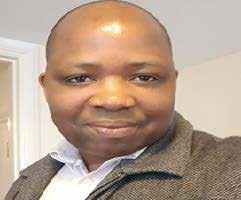
‘Evolving Statutory Derivative Action Principles in South Africa: The Good Faith Criterion and Other Legal Grounds’ Journal of African Law, UK, Journal of African Law, First View, pp. 1 – 19. Published online by Cambridge University Press: DOI: https://do
He was also able to successfully graduate 1 PhD student and 2 masters’ students. In addition, he attended the 21st Kuala Lumpur International Business, Economics and Law Conference on 20 June 2020 via Webinar, hosted by the Infrastructure University. He presented a paper
entitled: “Regulating the Conduct of the Business of Banking Prior and Post Banking Crises in South Africa”

MID-CAREER RESEARCHERS
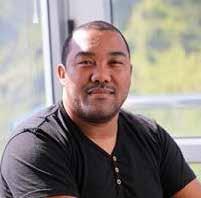
Marshall Keyster (Ph.D.) UCDG
The University Capacity Development Grant at the University of the Western Cape is a wonderful initiative from the Office of the DVC (Research and Innovation) and I would like to thank the team for all the hard work in keeping the operations as smooth as possible.
Through UCDG funding I have managed to achieve the following research activities under the funding period:
My expectations were to use the funding as seed funding to conduct research which could lead to a potential bigger project. The funding was therefore earmarked for pure research activities such as laboratory supplies in order to generate data. Furthermore, my expectation was to produce feasible outputs from the envisioned project in order to account for the funding support.
Full references of all publications from the UCDG funding 1. Bakare, O.O., Gokul, A. and Keyster, M., 2021. PR-1-Like Protein as a Potential Target for the
Identification of Fusarium oxysporum: An In Silico Approach. BioTech, 10(2), p.8.
2. Istain, B., Mokgokong, P.S., Wu, R., Mia, J., Gokul, A., Mendoza-Cozatl, D., Du Plessis, M. and
Keyster, M., 2021. Draft Genome Sequence of the Putative Endophytic Bacterium Pantoea agglomerans R6, Associated with Lactuca serriola from South Africa. Microbiology Resource
Announcements, 10(10), pp. e00023-21. 3. Gokul, A., Fahiem Carelse, M., Niekerk, L.A., Klein, A., Ludidi, N., Mendoza-Cozatl, D. and Keyster,
M., 2021. Exogenous 3, 3′-Diindolylmethane Improves Vanadium Stress Tolerance in Brassica napus Seedling Shoots by Modulating Antioxidant Enzyme Activities. Biomolecules, 11(3), p.436.
4. Niekerk, L.A., Carelse, M.F., Bakare, O.O., Mavumengwana, V., Keyster, M. and Gokul, A., 2021.
The Relationship between Cadmium Toxicity and the Modulation of Epigenetic Traits in Plants.
International Journal of Molecular Sciences, 22(13), p.7046.
MID-CAREER RESEARCHERS (contd.)
Prof. Marieta du Plessis “How UCDG grants have helped shaped my growth as researcher”
Prof. Marieta du Plessis’s interest in the field of Positive Organisational Psychology (POP), and positive leadership in particular, has been evident throughout her research journey. This research focus manifests in her postgraduate dissertations, publications, conference proceedings and a number of the topics of Master’s and PhD students who have graduated under her supervision. She highlights that, through her research endeavours, her understanding of the field has grown from investigating positive forms of leadership, to mediating mechanisms of leadership that ensure positive outcomes in the workplace. The finding that the mediating mechanisms could substitute leadership, necessitated the focus on these psychological capacities. This was done by proposing a definition of and a model depicting positive self-leadership as well as an intervention to develop such leadership in the workplace (Du Plessis, 2019). “The compendium of research outputs put me in a position to apply for a NRF rating, and subsequently a Y2 rating was received in 2021. My endeavours were also recognised through an Academic Achiever award as best mid-career scholar at the University of the Western Cape in 2019, as well as a nomination for most Masters Students supervised. Both of these achievements (i.e., the NRF rating and Academic Achiever awards) were matched with UCDG funding”, stated Prof. du Plessis. Through UCDG funding, she was able to apply her strengths and hone her abilities in engagements with colleagues (internally and externally), championing of projects and mentorship of fellowacademics. Not only have the UCDG grants provided her directly with resources and autonomy to advance the interests of her research group; it has also allowed her the opportunity to act as a mentor for other academic staff members and students benefiting from such grants. Selected accepted/published outputs that were supported through UCDG funding:
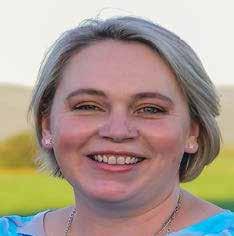
Barnes, N., Du Plessis, M. & Frantz, J. (in print). Career management programmes for academics in the Higher Education sector: A RE-AIM systematic review. SA Journal of Higher Education.
Barnes, N., Du Plessis, M. & Frantz, J. (2021). Perceived career management challenges of academics at a South African university. SA Journal of Human Resource Management, 19(0), a1515. https://doi. org/10.4102/sajhrm.v19i0.1515
Frantz, J., & Marais, J. & Du Plessis, M. (in print). Exploring the views of academics on an academic leadership programme in Higher Education. SA Journal of Higher Education.
Naidoo-Chetty, M. & Du Plessis, M. (2021). Job demands and job resources of academic employees in Higher Education. Frontiers in Psychology, 12, 631171. https://doi.org/10.3389/fpsyg.2021.631171
Naidoo-Chetty, M. & Du Plessis, M. (2021). Systematic review of job demands and job resources of academics. International Journal of Higher Education, 10(3), 268-284. https://doi.org/10.5430/ijhe. v10n3p268
Waglay, M., Becker, J. R. & Du Plessis, M. (2020). The role of emotional intelligence and autonomy in transformational leadership: A leader member exchange (LMX) perspective. SA Journal of Industrial Psychology, 46(0), a1762. https://doi.org/10.4102/sajip.v46i0.1762

LEADING RESEARCHERS
Prof. Joliana Phillips
Overview of how the UCDG added value to my research and support (Prof. JS Phillips).
Prof. Joliana Phillips received the UCDG funding in 2019 to assist in building a research team in the area of traumatic spinal cord injury in Africa. Her team included five members from the UWC of which 4 were junior staff members. Her collaborators included two professors from Karolinska Institute in Sweden, two academics from Rwanda, a potential PhD student from Zambia and Kenya respectively as well as one from Namibia.
She states that “the grant afforded me the ability to facilitate a writing retreat to assist in the preparation of manuscripts in the area of traumatic spinal cord injuries as well as the preparation of presentations for the World Confederation of Physical Therapy Congress in Geneva.”
Outputs related to this below:
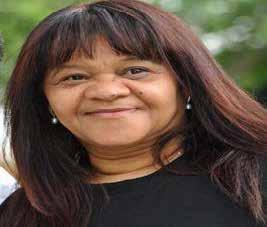
Academic manuscripts: 1. Conradsson, D., Phillips, J. Nizeyimana, E., Hillier, C. & Joseph, C (2019). Risk indicators of length of acute hospital stay after traumatic spinal cord injury in South Africa: a prospective, populationbased study. Spinal Cord, DOI: 10.1038/s41393-019-0286-0
2. Nizeyimana, E., Joseph, C. Phillips, J. (2020). Quality of life after traumatic spinal cord injury in a developing context: the influence of contextual factors and injury characteristics, Disability and
Rehabilitation, DOI: 10.1080/09638288.2020.1827051.
3. Madasa, V., Boggenpoel, B., Phillips, J. Joseph, C. (2020). Mortality and secondary complications four years after traumatic spinal cord injury in Cape Town, South Africa. Spinal Cord Series and
Cases 6, 84. https://doi.org/10.1038/s41394-020-00334-w
4. Nizeyimana, E., Joseph, C. & Phillips, J. (2021) The role of self-efficacy in community reintegration among persons with traumatic spinal cord injury in South Africa, The Journal of Spinal Cord
Medicine, DOI: 10.1080/10790268.2020.1855867
Conference presentations: 1. Nizeyamana, E. & Phillips, J. (2019). Relationship between self-efficacy and community reintegration among persons with traumatic spinal cord injury in the Cape Metropolitan Area,
South Africa. World Congress of Physiotherapy, 10-13 May 2019, Geneva, Switzerland.
2. Joseph, C., Boggenpoel, B., Phillips, J. & Madasa, M. (2019). Mortality rate and risk indicators for death of persons with spinal cord injury in South Africa. World Congress of Physiotherapy, 2-4
July 2017, 10-13 May 2019, Geneva, Switzerland.
The grant further afforded her the opportunity to attend a seminar/meeting in Sweden at Karolinska Institutet and Rebab Station, Stockholm regarding experiences of individuals with chronic pain after
sustaining a traumatic spinal cord injury. A potential PhD student could attend these seminars/ meetings with her and another UWC team member and collaborators. This afforded her student to conceptualise a proposal for her PhD project which she could successfully submit to higher degrees and ethics committees in 2020.
She concludes by stating that, “as one of my aims was to build teams in the area of traumatic spinal cord injuries in Africa, I successfully recruited PhD students to the UWC, one from Kenya, Zambia, Rwanda, Namibia and South Africa respectively. These students are supervised by me and the supervisory team include colleagues from Sweden, Rwanda and Zambia”.
Prof. Rouaan Maarman
The UCDG funding supported me to continue to do research despite the pressures of being a Deputy Dean in a teaching-heavy faculty. As such over the past two years there were crucial milestones that I reached. Firstly, I visited Nelson Mandela University to engage colleagues around research collaborations between our faculty and NMU’s Faculty of Education. During this visit we engaged about the research interests of the two faculties, the emerging research niche areas in our faculty, teaching and research collaborations e.g., Moderation and external examination engagements. These arrangements were shared in our faculty and many staff members took up the opportunity to engage staff at the NMU.
Secondly, The UCDG grant also allowed me to appoint a research assistant to assist me with basic research work. The RA attended to literature searches, editing work of my writings and communication with research participants etc. This is a crucial opportunity that staff in leadership and management positions need to advance their research. Furthermore, a key outcome of the UCD support is the research team I could put together around a pressing national imperative in Education, namely, “capability enhancement in basic education”. Although I did not fund the postgraduate students’ activities from the grant, they came together under a research focus which will be further developed via workshops, writing retreats and seminar presentations. One of the students presented his research of his master’s thesis in the UWC Research Week of 2020. This group of postgraduate students include one masters and two doctoral students.
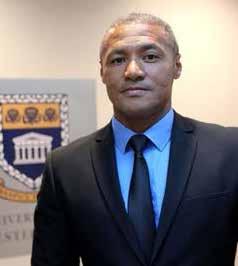
Below are the research engagements that also led to invitations to comment publicly on basic education matters.
The following research outputs were possible over the period of the grant support; Esau, D & Maarman, R.F.A. 2021. Re-imagining support for beginner teachers in relation to initial teacher education policy in South Africa. South African Journal of Education. Forthcoming in 2021.
Barnett, E & Maarman, R.F.A. 2020. Principals’ views of the implementation of the No-fee policy through the lens of capability theory. South Africa Journal of Education. Vol. 40. No. 3.

Esau, D & Maarman, RFA. 2019. Re-positioning the competences of beginner teachers in South Africa: a capability perspective. South African Journal of Higher Education. Vol. 33 No 6 of 2019.
Nwati, MP & Maarman, RFA. 2019. Reframing the quality education discourse via a capability analysis of quintile 1 (poor) school communities. Southern African Review of Education. Vol. 24 Issue 1. pp 109-125.






